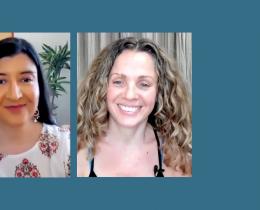Omega: The “New Economy” has moved beyond freelancing and is flooded by terms describing it variously as: gig, sharing, informal, barter, contract, and online. What does The National Domestic Workers Alliance (NDWA) mean by “caring economy” and “care” as a value—not just a monetary value?
Raquel: The caring economy is the work that people (mostly women, women of color, and immigrants) do to provide childcare, eldercare, and healthcare. We see care as "the work that makes all other work possible." Domestic workers (unpaid or underpaid) act as nurses, schoolteachers, chefs, cleaners, counsellors, and healers in homes across the country. Without them playing these vital roles, people wouldn't be able to do their own jobs—which are often seen as the real work. The work it takes to raise a family, of all generations and abilities, has too often been devalued in this country—which manifests in a monetary sense but also in a cultural sense. NDWA believes it is critical to change the culture so that each person feels treated with dignity and is respected for their work.
Omega: What is Strategy – Organizing – Leadership (SOL) and the importance of somatic body practices, such as centering and meditation, in transformative leadership training and organizing?
Raquel: At NDWA, domestic workers and organizers lead in so many ways—through their work in communities, national campaigns and gatherings, and training programs. SOL, in collaboration with Generative Somatics, is one opportunity for leaders committed to building movements to become even more powerful! Over the course of a year about 65 domestic workers come to four 4-day retreats to deepen their analysis of the inequality in our world, increase their ability to use organizing as the main strategy for change, and invest time and energy in their personal transformation.
Often, participants carry the impact of many difficult life experiences, which sometimes limits their ability to act from their full potential. The somatics practices are one way they can reconnect with their resilience and recenter themselves in their daily lives. The collective practices enable them to build deep relationships in the group and outside in their work. They also develop a commitment that guides them each day as individuals. For instance, we ask them to engage in a daily practice like centering or incorporating their commitment into a daily prayer. Lots of women have reported that having a commitment and a centering practice when doing outreach—when you can get dozens of No's—has allowed them not to take the No's personally and remain connected to their dignity.
Omega: Why were you attracted to this work? When did you first identify as an activist?
Raquel: According to my mother, I was an activist in the womb! But I consciously became involved as a teenager when visiting a Planned Parenthood at the height of Christian conservatives blocking access to the clinics. As my friend and I tried to walk in, a full grown man pushed me to the ground. And as I fell, I thought, "what a hypocrite pretending to fight for the children and so easily knocking me to the ground!" After that, I spent every weekend driving to clinics to block them from blocking people seeking healthcare.
Being part of SOL is one of my favorite things I've ever done in life. Almost nothing matches seeing the power, light, and confidence that grows in each person with every retreat. To work with this team led by Ai-jen Poo, witness everyone's hard work, and be asked to show up fully every day is a great honor.
Finally, over the last four years, I was privileged that my father let me care for him as he passed. Besides helping my mother with the medical and logistical aspects, I wanted to make sure he felt dignity and love in the hardest moments. My activist experience has been fueled by a desire for justice and dignity, but this experience with my parents and family gave me the most intimate look into the value of domestic workers and the need to honor all people.
Omega: What is your hope for the future of labor organizing and traditional benefits—such as sick days and overtime pay—in an evolving, and increasingly tech-driven, economy?
Raquel: The emergence of new tech platforms in the care industry has created the opportunity to raise standards through a small number of touch points as opposed to working through thousands of individual employers. NDWA is seizing this time to intervene in the emerging online markets for care (sites like Care.com), with a project designed to advance our goals to increase understanding of the need for culture change in home-based care, raise standards for domestic and care workers, and improve the quality of home-based care. In October 2015, we launched the Good Work Code, a framework for online companies that use a platform or marketplace to connect workers and customers, such as people needing childcare or eldercare, for example. The code creates a vision and shared understanding of what "good work" looks like through the framework of key values like "stability and flexibility" and "a living wage."
Omega: Can you describe Step Forward, the initiative you launched for International Women’s Day, and its importance?
Raquel: More than 5 million undocumented immigrant women live and work in the United States and many may qualify for immigration relief immediately or for DAPA in the future. Unfortunately confusing, untrustworthy, or fraudulent information about immigration relief and workers rights is all too common. High fees, lack of access, and fear prevent many immigrant women from getting information and acting on their rights and options. Step Forward provides immigrant women and their families free access to tools, trusted resources, and up-to-date information on workers rights and immigration relief.



